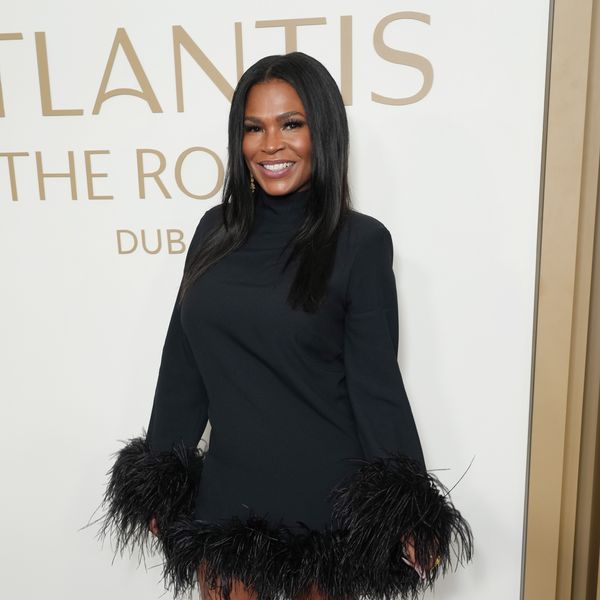
Breadwinner Politics: What To Do When You Earn More Than Bae
While Black women still face the issue of unequal pay and systemic challenges to upward mobility, there’s still apparently a pretty significant number of us who are making more than our significant others. A 2023 Pew Research report found that Black wives are “more likely than wives from other racial or ethnic groups” to be the breadwinner in their marriage. Almost one in four Black wives (26%) out-earn their husbands.
Black women are also more likely to earn college degrees than their Black male counterparts, making the earnings gap even more of a reality whether you're married or not.
If you’re dating and your salary is higher than your partner’s, it can seem awkward or downright scary to talk about money with them. And as a woman earning more than her partner (or who has the potential to more than likely out-earn a love interest), you might be tempted to go all in with questions and investigations related to investments, car choice, child support cases, and credit score on the first date.
But before you do that, pause and think about this: Why ask about credit scores and salaries on a first, second, or even 100th date when you don't even know if that person has integrity, values that align with yours or isn't out here trying to make you the next Reesa Teesa?)
How To Have The Money Conversation As The Breadwinner
I’ve been in several relationships where I earned more than my man, and while it’s not something I’m ashamed of, that gap did have its implications. For me, if the man was treating me with respect, love, and attention, I really didn’t care that he might be taking home less pay. The tragic part of that would be when some of the guys I'd dated saw me spending money on designer bags, going out to eat more than three times a week, or taking trips, there would be issues of passive-aggressive judgment, resentment, and eventually relationship sabotage. (I’ve also dated men who earn six figures and above, but that’s a whole other story.)
Sometimes we become the breadwinners due to circumstances that are beyond someone's control or due to a life transition. Maybe your spouse was laid off from the job two years into the relationship or marriage, or they had to take on the care expenses for an elderly parent. Maybe they're in the throws of launching a new business or pursuing higher education, or the person was hit with a lawsuit, health scare, unforeseen tax bill, or other financial emergency. So it's not always an issue of fault, fraud, or scandal, and can be more of a case of life life-ing.

Georgijevic/Getty Images
All relationship dynamics are different, so what one woman sees as a red flag might not be a huge deal-breaker for others. I’m super-ambitious and self-employed, have found long-term success in a media industry perfect for independent go-getters, and I’ve always embraced having a side hustle.
Considering what many Black men face in society in general, I could understand and accept the possibility that my ideal mate might earn less money than me.
In my current relationship, ongoing for seven years, the breadwinner status has shifted multiple times, and for the most part, my man is my man. Period. After getting through some very tough times including surviving a whole pandemic, healing from surgeries, and coping with deaths in our families, there are things beyond money that have become golden for me in my love and loyalty toward him.
Whether you're married or you've been in a relationship for the long haul, here are a few helpful tips I’ve learned along my journey as well as what the experts say about it:
1. Use fun and humor to spark the money conversation.
I've always been one to shy away from talking about money with anyone, as that's just not something we did when I was growing up. For the most part, I saw the men in our family, whether they were the breadwinner or not, taking charge of the spending in the household and they oftentimes paid for everything, even if, for some, the bulk of the money was earned by their wives. It seemed to be an unspoken rule that everyone must have the perception that the man was calling all the shots financially (when I'd later find out, that one man in the family, for example, was often unemployed.) I only learned through observing things, not through conversations for clarity, confirmation, or understanding.
So when I started working and dating seriously, I'd just avoid speaking up when men would love-bomb me after seeing how I dressed, or when I'd find out that a guy who had spent $200 on a first date was actually struggling—making $1200 a month before taxes—and was just trying to impress me.
Today, humor and fun are helpful in having conversations about money. Early in our relationship, my man and I would play a game and ask questions of each other about how much we'd spend on a house or what we would do if we had $1 million. We might find humor in the money mistakes we've made in the past and those conversations would often lead to very serious conversations about debt, current bills, quality of life standards, and how we can work together to help one another achieve our respective goals.
Leaning into humor has helped me have those hard conversations—to get to know my partner more—and they've allowed him to feel a bit more comfortable about sharing information about his finances with me. One expert agrees that adding humor to conversations about money can be beneficial. “I think that keeping it light is the best way to learn. If we lower the temperature, if we make it fun, if I tell you how I have screwed up everything and I still did okay, that we can all come out of this much, much better, we'll relax and do a better job with our money,” Joe Saul-Sehy, co-host of NerdWallet's Smart Money Podcast, shared during an episode.
2. Put mutual respect and consideration at the center and approach with grace and love.
Bola Sokunbi, founder of CleverGirl Finance, breaks this down very well in sharing her own experience with being the breadwinner in a relationship. “Just because you earn more doesn't mean you should become the evil queen dictating how every penny is spent, checking all the bank accounts, and asking for a play-by-play of every transaction your partner made,” she writes. “Think of how you would want to be treated if the roles were reversed. Allow your partner to make financial decisions; remember you are part of a team, and it is a partnership.”
While you should feel no shame or guilt for your success as the breadwinner, there's still a way to talk about money with your spouse that does not demean or belittle them. And you need to be clear about your own financial blind spots, habits, and mindset in order to come correct in a conversation about money with someone else.
Just because you're the breadwinner doesn't mean you're great at managing money or have the best personal finance habits, so consider humility and decency when talking with your partner about their own. (I can admit that I've dated men who made less but treated their money better than I did. Several were even better at managing what they had and building savings versus always living check to check, which was my reality at certain times in my life.)
Whatever your desires are when it comes to money and its role in your relationship, approach the conversation with respect, grace, love, and consideration that you’re talking to someone you care a lot about. Figure out what you're willing to compromise on and what you're not, and go from there.

skynesher/Getty Images
3. Instead of pausing, tip-toeing or avoiding, address behaviors that reflect habits and values.
Timing is a sticky aspect when you're talking about finances with your partner or spouse, whether you're in a long-term relationship, in the early stages of a romance, or you've already walked down the alter. From my own experience, being strategic in talking early on about what matters to me, in general, is key. And using my own senses of observation and gut feelings is important, too.
"'Fess up about the debt too soon and you risk scaring that special someone away, " Kimberly Foss, a certified financial planner, told Forbes. "However, if you wait too long, it can complicate things. If you are becoming very serious in your relationship, it is time to speak up. [If you carry a lot of debt], think of the roles being reversed — wouldn’t you want to know? You might be surprised just how understanding and open your partner is."
At the end of it all, it's not really about the money but about compatibility in one's outlook on what success means, what trust entails, what quality of life they want, and how they see partnership in a relationship. A few observations I think are more telling than outright asking a man about his credit score would be to watch early on for signs of greed, jealousy, uncontrollable anger, indifferent complacency, scarcity mindset, and ego.
Experts also recommend that married couples should especially embrace open communication to come up with a plan of action that they both can agree on. If you're expected to carry the financial load at any time in the relationship, set healthy boundaries and hold your partner accountable. You can also get help in the form of a therapist, counselor, or financial adviser to create or adjust the plan and help you navigate through bumps in the road without heading to TikTok for a 50-part series or, worse, divorce court.
Let’s make things inbox official! Sign up for the xoNecole newsletter for daily love, wellness, career, and exclusive content delivered straight to your inbox.
Featured image Stígur Már Karlsson /Heimsmyndir/Getty Images
- Ever Wonder If Your Man Is Actually Holding You Back In Life? ›
- Why Black Women Are Choosing Careers Over Marriage ›
- Are You The Financial Supporter Of Your Husband's Dreams? This Is For You. ›
These Newlyweds Found Love Thanks To A Friend Playing Matchmaker
How We Met is a series where xoNecole talks love and relationships with real-life couples. We learn how they met, how like turned into love, and how they make their love work.
Jason and Elise Robinson’s union is a reminder that kind people still get their happily ever after. The pair had their first date in October of 2021 and tied the knot on June 15, 2024. Both of them have dedicated their lives to celebrating and supporting Black culture so it was only fitting they get married in what's considered the Black Hollywood of America during the Juneteenth celebration weekend. From the florists to Elise and Jason's gown and suit designers to the table signage and so much more, everything was Black-owned. It's no wonder their love for Black culture was the jumping-off point for their love story.
When they met, Jason had just moved to Atlanta for a new job opportunity, and Elise was living happily in her career and had put dating on the backburner. But luckily, a mutual connection saw something in both of them and thanks to a yoga-themed baby shower and a chance text message, they found their forever. Check out their beautiful How We Met story below.
I’ll start with the easiest question. Can you both tell me a little bit about yourself and your background?
Elise: Sure, my name is Elise. I’m actually from Atlanta, GA – not a transplant. I grew up here and left right after college to pursue my career. Now I’ve been back going on eight years, and I’m in my early 40s.
Jason: And I’m Jason. I’m originally from Racine, Wisconsin. I went to school at Florida A&M University, so I am a rattler. I went back to the Midwest for a period of time, in Indianapolis. Now, I’ve been in the Atlanta area for a little over two and a half years.

Jason and Elise Robinson
Photo by FotosbyFola
Wow, that’s nice because Atlanta gets a bad rap when it comes to relationships. So you have to give us the deets. How did you two find each other?
Elise: So I work in TV and I was on-air for a number of years and then transitioned into being a producer and then a manager. As a producer, I’d always have guests on. And there was a woman who came on frequently named Rosalynn (@Rosalynndaniels, often referred to as The Black Martha Stewart), and we connected instantly. Anyway, she got pregnant right before COVID and invited me to a “modern-day yoga baby shower.” I came to support, but was also just curious about that theme.
I had an amazing time. And when it was over a few of us stuck around and convos got personal. She ended up asking me the infamous ‘Are you dating’ question. When I told her no, she decided to set me up. So I should tell you, in both of my only two serious relationships, I was set up – so I was like no.
But she pointed at her husband, who was folding up chairs, and said that another friend set her up with him. Sometimes, it takes people outside of us to see what we need. A few months later, she reached out and said she had family relocating and thought I’d really like him. So she gave him my number, and I reached out with a text. He responded with a call, and that night, we talked for about 2-3 hours. So that’s how we met. I was a little nervous because me and Rosalynn were starting a friendship, and here I was, talking to her family!
Jason: It was new for me too. Remember, I was new to the area, and I had heard so many “stories” about how people have been done wrong in the dating world. Whether it’s by theft or scamming (laughs). Plus, I had just got a new job and wanted to focus on that. But I did want to be able to date someone in a more personal way and see where it led. I felt like who better than someone who I trust to connect me. Rosalynn knows I’m private, about business life, and my personal life is important to me.
So let’s get into your courtship. What was your first date like?
Elise: We had our first convo on a Monday, and he asked me out the next day. I didn’t have any plans, but I still said no. I was just playing hard to get (laughs). But we were talking every day, and he told me he wanted to take me somewhere I’ve never been. And I’m like, you’re in my city! But he sends me three options, and sure enough, two of the places I hadn’t gone to. So, our first date was October 1, 2021, and somebody was 45 minutes late.
Now Jason, why were you 45 minutes late?
Elise: It was me – in my own city. I just got turned around, and the traffic was horrible. I kept calling him and giving him permission to leave. Full transparency: I probably wouldn’t have waited if the shoe was on the other foot. But this was my first sign of what I now know and love the most about him. It’s his patience. When I got there, I was frazzled and everything, but he was just super calm. It ended up being a great first date.
Jason: I remember just waiting and being concerned for her well-being. Because I know how traffic can be, especially when someone is rushing. I was just scrolling through my phone and looking through the menu. It was cool.

Elise and Jason Robinson
Courtesy
That’s beautiful. Now let’s talk about the “what are we” convo? Did you have one of those and if so, who initiated it and how was it?
Elise: I initiated it. Jason was dating me – and still does. But by this time, we had been on a number of dates. We were on our way to a winery, and we had a bit of a drive. So I decided to state my intention. We were just a few weeks in, but we were spending a lot of time together and we are people of a particular age. So I told him, I know Atlanta can be a Black man’s playground. There’s so many beautiful professional women here. But I’m dating with intention. I don’t want to kick it or hang with a good guy even though he’s not my person. I was done with all of that. So I’m “laying down the law” in my eyes, and he didn’t flinch. He let me finish and basically let me know we were on the same page. He was not trying to sow his royal oats.
Jason: Yeah, I was not trying to be Prince Akeem. But also, it was more so about setting a tone and goal for myself. My mama always told me to set my goals. And having a family was always one of mine. I think the biggest thing of it all, was I felt blessed – in terms of moving for work and meeting Elise, now being married. There’s victories being placed in my life.
I love that you both shared that because sometimes I get feedback on these stories and it seems like sometimes we’re afraid to really voice what we desire, no matter what that looks like.
Elise: Yeah, I think sometimes women feel like they don’t want to put pressure on their partner. But it’s not pressure. Look, Jason and I are based in faith, and what is for us is for us. Being upfront and honest is best – and early makes sense. You don’t have to convince someone to be your person.
Jason: I think her sharing those values resonated with me, and hearing her “lay down the law” was fine because I was there, too. I would say to millennial women, don’t be afraid to tell a mate what you want. You never know what that would lead to. Time is a precious commodity. Elise saying that early on showed me that she values both of our time. It showed her heart, character, and integrity, and I was drawn to that and the mature conversation. In the social media world, we don’t have those pointed conversations face-to-face. I would challenge readers to have those conversations in person, and you would get more from that convo than any post or reel. Because you see body language reactions and have deeper communication.
Yeah, I think sometimes women feel like they don’t want to put pressure on their partner. But it’s not pressure. Look, Jason and I are based in faith, and what is for us is for us. Being upfront and honest is best – and early makes sense. You don’t have to convince someone to be your person.
You both have mentioned time, family, and integrity. I’m curious what other core values do you both share?
Elise: Early on, our faith. Not just do you believe in God. It had to be deeper in that. I needed someone who would lead me, our home, and our family. I didn’t want to be in a push-and-pull relationship about prayer, church, or have conversations about being better people. Also, we discussed finances. That doesn’t just mean going to work. We chatted about ownership and what it looks like for us. How do we support each other individually and together? I know I like having my hands in a few different pots, and I needed someone who was supportive of that and likewise.
Jason: My background is that I was raised in the church. My father is a deacon and my mom is a deaconess. They've been married for 55 years. Faith was very important to me and it was crucial that my wife have that relationship as well.

Elise and Jason Robinson
Photo by FotosbyFola
Can we talk about challenges? Big or small, what are some things you had to grow through together?
Elise: I have never lived with anyone – not a roommate, a sister, friend, boyfriend or anything. Now, I’m in my 40s and I'm living with someone. When you’ve been by yourself for so long that was a challenge for both of us. We weren’t pulling each other's hair out but I’m a bit extreme. Things are color-coded in my closet. For me, working in news is chaotic so I want my home to be peaceful and organized.
Jason: I’m a man, and she’s a woman. That dynamic alone adds a flair to it. She wants things a certain way. She’s a Capricorn. But just in terms of how she wants to keep a home was a big adjustment for me. It took time.
On a smaller level, what are some of the things you disagree about day-to-day?
Elise: Cleanliness and systems. Like, he recycles and I do not. But sometimes I just have to decide if it really needs to be a thing or if I can just take care of it.
Jason: This is where my organization takes over (laughs).
What are your love languages? Do you know?
Elise: Jason’s is an act of service which works because I love cooking for him. It doesn’t feel like a chore to me. I love when I’m out, picking up his favorite juice. The other day I saw he needed t-shirts while folding clothes. So I just like doing small things for him that he doesn’t expect. He’s very much that guy that will ask to help so it doesn’t bother me.
Jason: I’d say Elise is all of them, but physical touch would probably be the biggest one. I had to get used to that. She’s taught me it in a number of ways. I remember we actually talked about love languages, and I sent her this song called “More Than Words” by Extreme. That explained to her how I felt.
Finally, can we end with the proposal? Tell us everything!
Jason: It was at a restaurant. And again, I was trying to find somewhere she hadn’t been. Also, I didn’t want to do it on our anniversary because that would have been too obvious. I contacted one of the restaurant’s staff and decided to change up the dessert menu. Each item was something special to us.
Elise: We go on so many date nights, so I just thought it was a regular night. We had finished eating, and I had to go to the bathroom. They had a nice mirror, girl. So I’m in there taking videos and stuff.
Jason: While she’s in the restroom, I’m getting everything in place with the waitress.
Elise: So as I’m reading the menu, I realize it’s telling our story and he eventually proposed. It was so special; I actually had the menu framed! It was so beautiful and thoughtful.
Let’s make things inbox official! Sign up for the xoNecole newsletter for love, wellness, career, and exclusive content delivered straight to your inbox.
Feature image by FotosbyFola
This Is How To Make Essential Oils Your Ultimate Nail Health Hack
Something that I will forever back until the end of time is essential oils. One reason is that they are all-natural (essential oils are basicallyplant extracts). Another reason is that the (proven) holistic health benefits that come with using them (consistently) aredamn near endless. And lawd, don’t even get me started on how wonderful many of them smell — and how they tend to last longer than a lot of the perfumes and colognes that are out there. Definitely, for as long as essential oils are in existence, I’ll be singing their praises.
Today, the lane that I’m gonna be in is how you can apply certain essential oils to your nail care regimen. Since it should be the goal of all of us to be intentional about doing what we can to havestrong and healthy nails, I’m going to share with you 10 oils that are proven to help you reach that very goal (just make sure that youmix them with a carrier oil like apricot, grapeseed or jojoba first; essential oils are way more potent than they are oftentimes given credit for).
The Best Essential Oils for Nail Health

Getty Images
1. Tea Tree Oil
Believe it or not,nail fungus is pretty common.Some studies say that 1 in 10 people will experience it; that number jumps to 1 in 2 for individuals over 70. When it comes to this, signs to look out for are nails that look white, yellow, or brown, nails that seem to rise up from your nail bed, nails that are cloudy-looking in areas, and/or nails that easily break or split in more than one spot. Depending on how serious the fungal growth is, your doctor may prescribe an oral medication, a prescription-strength topical one, or even try a laser treatment of some sort.
However, if what you’re going through is minor, you might only needsome tea tree oil to get everything under control. Since it’s the type of essential oil that contains potent antifungal and antiseptic properties, applying it to nail fungus can significantly reduce fungal growth in a relatively short period of time without over-drying your nails in the process.
2. Myrrh Oil
Since myrrh oil contains so many powerful antioxidants and is able tokill harmful bacteria quickly, that already makes it a great essential oil for nail care. Also, since it contains properties that help to keep your skin healthy, it’s also a wonderful cuticle oil (especially if you mix it with a carrier oil like sweet almond oil, plum oil, or sesame oil). Another thing to keep in mind is if you’ve recently injured your nail(s) in some way, myrrh oil contains properties that help to reduce swelling at a pretty accelerated pace.
3. Juniper Berry Oil
An essential oil that has a good reputation for both healing as well as protecting your skin is juniper berry oil. In fact, if you’ve got a bit of foot odor going on or you’ve noticed some nail fungus creeping up, if you apply the oil to your feet (or nails) while you’re in the shower, it can help to eliminate the smells and speed up the healing process.
Another bonus about this particular oil is it has astringent properties that can help to keep your nails nice and clean.

Getty Images
4. Lavender Oil
Another oil that’s ideal forfighting nail fungus is lavender oil. In fact, in Healthline’s article, “Can You Use Essential Oil for Toenail Fungus?” lavender is on the list. That’s not all. If you happen to havenail eczema,the properties of lavender oil have the ability to soothe and heal the symptoms that come along with it, including nail softness and shedding. It’s also a good idea to keep in mind that if you want to addmoisture to your nails or cuticles, lavender oil is one that can hydrate your nails without a ton of residue.
5. Clove Oil
Since clove oil is considered to be an antimicrobial oil, it’s another one that is able to kill bacteria. Something else that’s cool about this oil is it can bring quick relief to pain and discomfort if you’ve broken a nail or you’ve got a hangnail that’s getting on your last nerve.Two other big wins about clove oil are it can help to even out any skin discoloration that you may have around your cuticles and it can help to keep your nails and hands looking youthful too (because, yes,nails do age).
6. Sage Oil
Sage oil also has some pretty impressive antibacterial properties in it. It also has the ability to condition your skin as well as your nails. This means that if you happen to struggle with brittle nails or nails that seem to peel, applying this oil to it can help to naturally reverse those issues. Also, if your nails seem to look a bit on the dull side, sage nails can give them a natural sheen if polish isn’t (really) your thing.

Getty Images
7. Geranium Oil
An essential oil that’s great at fighting off all types of infections isgeranium oil. What I especially like about it,as far as nail care is concerned, is that it’s got a solid reputation for moisturizing your nails so that they’re able to grow stronger and longer. Since it’s an oil thatcontains anti-aging properties, geranium oil can help to keep your hands (and feet) younger-looking for a longer period of time as well.
8. Lemon Oil
Hangnails are the absolute worst. Typically, those annoying things come as the result of having dry cuticles or constantly picking (or biting) the skin around your nails. If you make a cuticle oil out oflemon oil, not only can that help to nourish your cuticles and nails, but it can also repair any tissue damage that you may have as well as deeply cleanse your nails too. This, as a direct result, can help your nails to become stronger over time (plus, it doesn’t exactly taste the best, so it can help to keep your mouth off of your nails…which is a good thing).
9. Eucalyptus Oil
One of the most potent ways to treat a nail fungal infection is toapply some eucalyptus oil to it. In fact, one of the best things about taking this particular all-natural approach to a nail infection is it can kill the fungi without totally drying out your nails in the process. Also, if you’re looking for an oil that will protect your all-natural nails frompotential environmental damage, eucalyptus oil totally has your back as far as that is concerned.
10. Vanilla Oil
Now,I’m definitely preaching to the choir when I say that you should take a break from nail polish every once in a while. Just like your skin needs a mini-vacation from cosmetics and your hair needs one from the product (build-up), your nails need time to breathe on occasion, too; otherwise, the chemicals in the polish can lead to breakage, peeling, and weak nails overall. And while you’re on the break, try applying some vanilla oil to your nails and your nail beds.The antioxidants in the oil can help to speed up the healing process of your nails as well as reduce inflammation (if you’ve got any of that going on). It can also help to nourish your nails as they prepare for another few months of nail color.
___
I’m telling you, although there are all kinds of nail products on the market, if you get your hands on a few staple essential oils, you can feel confident that you’re giving your nails some chemical-free, holistically beneficial oils that will get your nails right in so many ways. I’m looking at my nails as I’m typing all of this out, and I can certainly attest to it. Try it — ain’t no way that you (and your nails) won’t like it!
Let’s make things inbox official! Sign up for the xoNecole newsletter for love, wellness, career, and exclusive content delivered straight to your inbox.
Featured image by ozgurdonmaz/Getty Images









